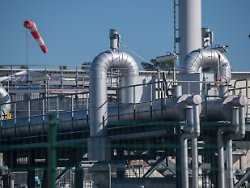Other suppliers in view
EU wants to quickly reduce Russian gas imports
3/8/2022, 5:21 p.m
The EU Commission wants to make itself independent of Russia’s gas supplies in the coming years. To do this, she wants to rely on renewable energies and imports from countries like Qatar, the USA and Egypt. US Secretary of State Blinken is also pushing for Europe’s independence from Russian gas.
The European Commission wants to drastically reduce the EU’s dependence on Russian gas. With the help of other suppliers and the expansion of renewable energies, the “EU demand for Russian gas can be reduced by two-thirds by the end of the year,” the EU Commission said. According to the authority’s plans, the EU should be independent of Russian fossil fuels by 2030 at the latest.
In view of the Russian war of aggression in Ukraine, US Secretary of State Antony Blinken also called on Europe to reduce its energy dependence on Russia. “I think it’s not just a significant opportunity, but a necessity at this moment for many countries in Europe to finally break away from their dependence on Russian energy. Because Russia is using it as a weapon,” Blinken said during a visit to Estonia. There are already countries that have responded and made efforts. It is essential to move forward with renewable energies as quickly as possible, said Blinken in the Estonian capital of Tallinn.
Ukrainian President Volodymyr Zelenskyy had called for a halt to energy imports from Russia because of the ongoing Russian attacks on his country. The federal government currently rejects such an embargo for Russian oil and gas. Estonian Prime Minister Kaja Kallas also expressed reservations about an embargo after her meeting with Blinken. When asked about it, she pointed out that “different European countries are dependent to different degrees” on Russian gas and oil. “We need to have alternative sources of energy,” Kallas said. The actions of Russia’s President Vladimir Putin seem to persuade all countries to focus more on renewable energies. But this won’t happen overnight, she said.
Supply secured this winter
According to the EU Commission, the Union currently gets more than 40 percent of its natural gas from Russia. In the case of a broader supply from alternative suppliers, the Commission is particularly focusing on liquefied natural gas (LNG). In the future, the EU could import more of this from countries such as Qatar, the USA and Egypt, according to the Brussels authority’s proposal. In order to ensure fuller gas storage facilities in Europe, the Commission proposed a rule that gas storage facilities must be at least 90 percent full by October of each year. The current level is around 30 percent. For this winter, however, the supply of the member states is secured.
In addition, more will be placed on biogas and hydrogen. Hydrogen is to be increasingly obtained from renewable energies, and the infrastructure for the production of hydrogen is to be expanded. The Commission also proposes further strengthening the expansion of renewable energies such as solar and wind power. The installation of solar systems on roofs should be accelerated, and approval procedures should also take less time.
With these proposals, the Brussels authorities want to act against the high energy prices at the same time. In this context, she proposes that the Member States maintain the measures they have taken to ease the burden on their budgets. Some countries like France had issued vouchers to low-income households. In Germany, the government launched a relief package in February, which includes a one-time heating subsidy for housing benefit recipients.
